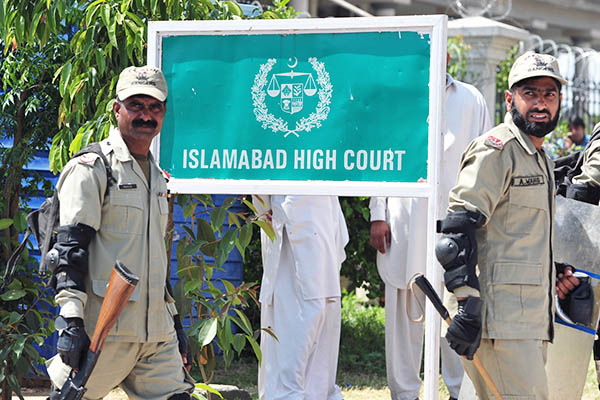
Farooq Naeem—AFP
Declaring controversial law as ‘unconstitutional,’ court directs authorities to take action against rights violations of FIA officials
The Islamabad High Court (IHC) on Friday declared the Prevention of Electronic Crimes (Amendment) Ordinance, 2022 as “unconstitutional, invalid beyond reasonable doubt” and struck it down.
A short order authored by IHC Chief Justice Athar Minallah on a petition filed by the Pakistan Federal Union of Journalists (PFUJ) against the President of Pakistan stressed that freedom of expression was a “fundamental right and it reinforces all other rights guaranteed under the Constitution.”
Noting that free speech was protected under Article 19 of the Constitution, and the right to receive information under Article 19A, the ruling said these were “essential” for the “development, progress and prosperity of a society and suppression thereof is unconstitutional and contrary to democratic values.”
“The criminalization of defamation, protection of individual reputations through arrest and imprisonment and the resultant chilling effect violates the letter of the Constitution and the invalidity thereof is beyond reasonable doubt,” it stressed, emphasizing that the controversial ordinance was promulgated “in derogation of the Constitution and the fundamental rights guaranteed thereunder.”
The ruling also struck down Section 20 of the ordinance, which allowed for the arrest without warrant of anyone accused of “harming the reputation” of any individual or institution, stressing it was unconstitutional beyond reasonable doubt. “The federal government is expected to review the defamation laws, particularly the Defamation Ordinance, 2002, and thereafter propose appropriate legislation” to Parliament for its implementation, it added.
The IHC directed the government to prove the conduct of the officials of the FIA’s Cybercrime Wing, noting it had abused its powers and violated the fundamental rights of citizens. “The court expects that the secretary [of the] Ministry of Interior will conclude the probe within 30 days from the date of receiving a certified copy of this order and inform the registrar regarding action taken against the delinquent officials,” it added.
Earlier, during proceedings, the court had remarked that the Federal Investigation Agency was advocating “self-censorship” through the controversial ordinance. Justice Minallah also said that non-implementation on already devised SOPs is the worst thing, asking that whether FIA has any other duty instead of saving the nationalities of the people.
At one point, the chief justice questioned the FIA on whether it was within its job description to monitor journalists. He also noted that if defamation was turned into a criminal offense, all politicians as well as vloggers would end up in jail.
President Arif Alvi, on Feb. 18, promulgated an ordinance amending PECA to make online “defamation” of authorities, including the military and judiciary, a criminal offense. Under the ordinance, anyone accused of “defamation” on social media could be arrested without warrant and remain imprisoned until their trial concludes. The law also called for all trials to be completed within six months, but allowed for extending them if the court deemed it necessary, essentially allowing citizens to remain imprisoned on the basis of unproven allegations. Section 20 of the ordinance had been amended to increase the sentence from 3 years to 5 years in case of attack on the identity of any person.
